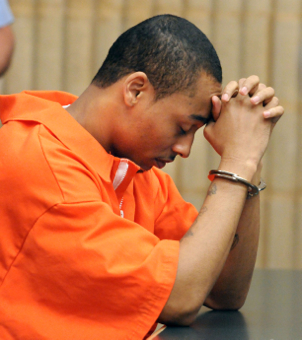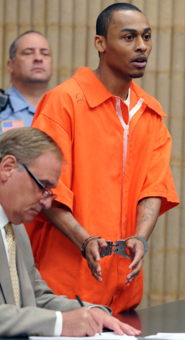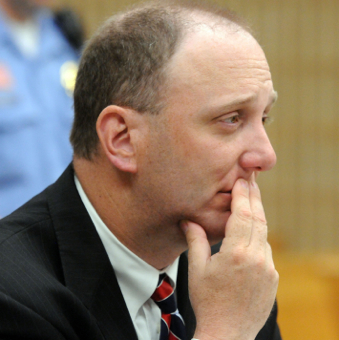 An Ansonia man serving a 50-year prison sentence for murdering a distant cousin outside a Derby bar is asking the state’s Supreme Court for a new trial.
An Ansonia man serving a 50-year prison sentence for murdering a distant cousin outside a Derby bar is asking the state’s Supreme Court for a new trial.
A jury at Superior Court in Milford found Cordaryl Silva, 28, guilty of murder after a five-day trial last spring.
Silva was convicted of killing Javon Zimmerman, a chief lieutenant in a Valley-wide drug dealing organization headed by Javon’s brother, Keyshon Zimmerman.
But in a 72-page appeal brief prepared by Glenn Falk, a lawyer at the New Haven Legal Assistance Association, Silva asks for his murder conviction to be set aside and a new trial ordered.
The lawyer argues the judge at the trial should have allow Silva to represent himself and should have barred a detective from answering certain questions about an interview with Silva.
Prosecutors have until Aug. 31 to reply to Silva’s filing. The Supreme Court has not yet scheduled arguments in the case.
Article continues after document.
Click here to read comprehensive coverage of the trial.
Silva v. Hopkins
Silva’s relationship with the lawyer who represented him at trial, Lawrence Hopkins, was strained, to say the least.
A year before the case even went to trial, Silva asked Judge Frank Iannotti to throw Hopkins, appointed as a special public defender, off the case.
The judge continued the case to allow Silva’s family time to get a new lawyer, but that never happened.
Months later, Silva told Judge Iannotti he could work with Hopkins.
 But moments before testimony in the trial was due to begin April 1, 2014, Silva asked Judge Denise Markle to throw Hopkins off the case.
But moments before testimony in the trial was due to begin April 1, 2014, Silva asked Judge Denise Markle to throw Hopkins off the case.
He complained to the judge that Hopkins hadn’t met him in jail or sent him evidence, and accused his lawyer of lying to him.
After Hopkins disagreed with Silva’s assessment, the judge told Silva the morning of the trial was not the proper time to raise such concerns, warning Silva to behave himself in the presence of the jury.
The jury was then brought in, but during about 15 minutes of the judge giving them basic instructions about the case, an animated and clearly displeased Silva continued to talk to Hopkins.
The lawyer then asked for the jurors to be excused briefly, after which he told the judge Silva wanted to represent himself.
The judge denied the request.
In Silva’s appeal, Falk wrote that the judge should have allowed Silva to represent himself.
According to the rules governing trials in Connecticut, a defendant can represent himself if a judge, after asking the defendant a series of questions, is satisfied that the defendant:
- Knows he has the right to a lawyer;
- “Possesses the intelligence and capacity to appreciate the consequences of the decision to represent oneself;”
- Understands the charges, the proceedings, possible punishments, and any other facts relevant to a “broad understanding” of the case;
- Is aware of the “dangers and disadvantages” of self-representation.
If such a request comes after the beginning of a trial, a judge must also weigh the defendant’s specific reasons for wanting self-representation, the quality of the defendant’s lawyer, and “the defendant’s prior proclivity to substitute counsel.”
In the appeal brief, Falk argues Judge Markle “gave insufficient weight to (Silva’s) fundamental constitutional interest in making his own choice to proceed without counsel, even though it was a bad choice in the court’s eyes.”
“The defendant’s reasons for the request were not frivolous — they went to the heart of his right to make a defense of his own choosing,” the brief says. “Among other things, his appointed lawyer failed to subpoena the witnesses he wanted, and the lawyer failed to cross-examine the state’s witnesses as he wanted, neglecting to bring out what he regarded as important details and contradictions.”
Falk argues the judge should have determined that “any lack of legal knowledge” Silva had “could have been easily remedied,” for example, by having Hopkins serve as “standby counsel.”
“In the court’s calculus, Attorney Hopkins’ professional judgment and experience with cross-examination should not have outweighed the defendant’s constitutional right to represent himself, even though the exercise of that right might prove to be disastrous,” the brief says.
“The record shows that the defendant was capable of representing himself,” it goes on. “He was articulate and had a GED. It was not enough for the court to observe that representing himself was contrary to the defendant’s best interests.”
What Does A Shrug Mean?
Falk also argues that Judge Markle should not have allowed a state police detective to answer certain questions during the trial about an interview he conducted with Silva days after the shooting.
Silva had been arrested on a probation violation charge which put him behind bars until he was formally charged with murdering Zimmerman.
While in custody at the state police Troop I barracks in Bethany, Detective Patrick Meehan interviewed him — after giving him the traditional “Miranda” warnings cops give suspects during interviews.
Meehan testified during the trial that Silva was “pretty cooperative” in the interview but wouldn’t answer specific questions about the shooting.
Meehan’s testimony included the following back-and-forth with prosecutor Charles Stango:
Q: Eventually do you ever ask him if he murdered Javon Zimmerman?
A: Yes, sir.
Q: What does he say?
A: He doesn’t reply. He doesn’t — he doesn’t admit or deny it. It’s just a blank stare and—
Q: Is there any response to your question at all at that point?
A: Just some non-confirmatory like shrugs.
Q: What do you tell him in terms of anybody who had come forward to point the finger at him? What do you tell Cordaryl with regard to people coming forward and pointing the finger thus far five days after the shooting?
A: Well we had said we had heard there were witnesses that saw you do the shooting in the parking lot and he just doesn’t reply.
Q: No response?
A: No verbal response.
Q: No confirmation that he did it?
A: No.
Q: No denial that he did it?
A: No denial.
 During his closing argument to the jury, Stango cited Meehan’s testimony about his interview with Silva, and asked the jury to “decide what is the important part.”
During his closing argument to the jury, Stango cited Meehan’s testimony about his interview with Silva, and asked the jury to “decide what is the important part.”
“Did you do it?” Stango said, referencing Meehan’s question to Silva. “The shrug basically told you what (he) did.”
In the appeal brief, Falk says the prosecutor’s use of Silva’s demeanor during questioning violates the constitutional right against self-incrimination.
“The Fifth Amendment cannot with one hand protect an accused from being compelled to testify and yet with the other hand permit trial counsel to argue that an accused’s silent demeanor in response to an accusation of wrongdoing is tantamount to a confession of guilt,” Falk wrote, quoting a prior case decided by an appeals court.
Stango’s questions to Meehan — and his closing argument — could have swayed the jurors’ minds, the lawyer argues.
“The kindred use of the defendant’s post-Miranda silence and demeanor in the present case was not so insignificant that it is clear beyond a reasonable doubt that the jury’s verdict was not influenced by it,” the brief says.
“The state trotted out the improper silence and demeanor evidence both in its case-in-chief and in its cross-examination of the defendant,” it goes on. “In some of the last words the jury heard, the prosecutor cited the defendant’s reaction to Detective Meehan’s interrogation as affirmative evidence of his guilt.”